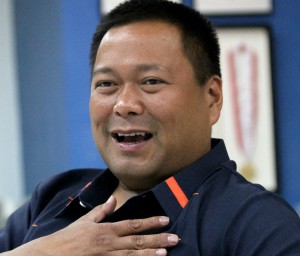MANILA, Philippines—Malacañang must first secure a commitment from the United States and other allies that they are prepared to defend the Philippines from external threats before the Senate considers an agreement that would allow foreign troops access to military bases in the country, junior senators said on Wednesday.
The Palace should also ensure that the Philippines does not end up under foreign control by giving access to foreign troops to its military bases, a Catholic Church official said.
Sen. Jose Victor “JV” Ejercito said Palace officials should have taken their cue from last year’s experience when no ally came to the country’s defense as Chinese vessels encircled and intimidated Philippine fishing boats at Panatag (Scarborough) Shoal, a rich fishing ground well within Philippine waters.
“We have seen during the height of tensions we had with China, we did not feel the support of Big Brother… We felt they were not really there to back us when China was bullying us,” Ejercito said, referring to the United States.
The Philippines and the United States have forged a Visiting Forces Agreement (VFA) that allows temporary presence of US forces in the country.
The agreement is invoked whenever joint military exercises between US forces and Philippine troops are staged, but never when China throws its weight around in the West Philippine (South China) Sea to intimidate the Philippines.
Allies’ support
“I think one of the provisions or conditions of the VFA is that if one ally is in conflict with others, the other one would support (it),” Ejercito said in an interview with the Inquirer.
Apart from reviewing the VFA, Ejercito said, the government must also “get a commitment from the US to fulfill (its) obligation to help (its) Little Brother.”
Other junior senators also cautioned parties planning the access agreement to first make sure to clarify the meaning and scope of any temporary stay that would be granted to foreign forces.
“Is temporary one year, two, 10 or 25 years?” Sen. Paolo Benigno “Bam” Aquino IV asked in an impromptu news conference at the Senate press office.
In a talk with reporters on Tuesday, President Aquino indicated he wanted to give the United States and Japan access to the former US bases in the Philippines so as to forge a “credible alliance” with them.
Aquino also dismissed China’s accusation that Manila was provoking Beijing by allowing foreign troops in its territory.
Not permanent
Ejercito said he did not believe granting the soldiers of foreign allies temporary access to Philippine military bases would be a problem.
“As long as we do not give them a permanent facility. I think it would just be in line with the VFA, which does not say it’s prohibited as long as it’s not permanent,” Ejercito said.
“Admittedly, we cannot defend ourselves from external aggression… The reason we favored the VFA before was that (US forces) would aid us in case the Philippines [faced an external threat],” Ejercito said.
Senator Aquino stressed that the Senate voted to reject a new military bases agreement with the United States in 1991, forcing American troops to leave Subic Naval Base in Zambales province and Clark Air Base in Pampanga province.
“Let’s not bring them back,” Aquino said.
“Of course, visiting forces are another matter. I think we should keep it at the level of visiting forces, but not for us to have another base and for them to stay here again,” he added.
“The period for bases is probably over. But on the issue of looking for partnerships or support, I don’t think there’s anything wrong with that… Probably we can keep it to that level first and let’s see,” Aquino said.
In separate interviews, two other junior senators—Juan Edgardo Angara and Nancy Binay—said guidelines such as the length of stay of any foreign force must be carefully studied before the Philippines entered into any access agreement with its allies.
Foreign control
Also on Wednesday, retired Caloocan Bishop Deogracias Iñiguez, chairman of the Public Affairs Committee of the Catholic Bishops’ Conference of the Philippines (CBCP), said the Aquino administration should make sure that allowing American and Japanese troops into the country will not violate Philippine sovereignty.
Iñiguez said granting foreign forces access to former US bases here should not lead to the Philippines coming under the influence or control of foreign powers.
Iñiguez said the Catholic Church would not keep quiet if it saw that the government’s decision would affect the country’s sovereignty.
“We need to maintain good relations with other countries, but we should see to it that this will not lead to them holding us by the neck,” Iñiguez said in an interview.
“To the extent that we become under them, that’s the bad thing. This (access plan) might be used to do that,” he added.
Iñiguez urged Congress to thoroughly investigate the details of President Aquino’s plan to open the country’s military bases to American and Japanese forces as tensions increase between the Philippines and China over territorial disputes in the West Philippine Sea.
“That is one of the competencies that our legislators and government officials should ask. Now, the Church will go into that when there are moral issues like colonialism and imperialism,” Iñiguez said.
“If that happens, we will certainly speak out because that is a moral violation of [our sovereignty],” he added.
Consequences
Iñiguez said that while the Philippine government “should be open to other countries,” it should try to foresee the consequences of allowing foreign troops access to the country’s military bases.
“We have to study this very well to determine what is really good for the country,” he said.
When asked if the “bullying” by China should be considered, Iñiguez said: “We are a member of an international family and part of that is having proper relations and coordination with another country. I think there are many other means to deal with bullying.”—With a report from Philip C. Tubeza
